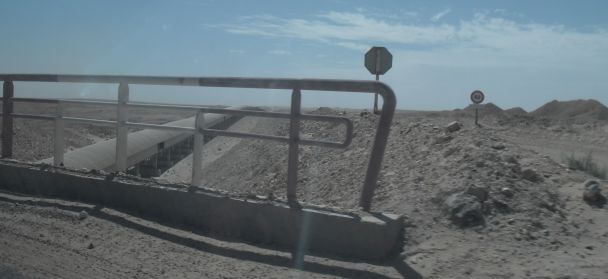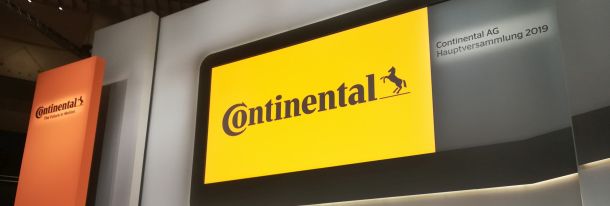
Continental’s controversial contract in occupied Western Sahara is two weeks away from expiration. If renewed, WSRW asks owners to raise the matter at upcoming AGM.
On 30 June, the contract of Continental AG with Morocco’s state-owned phosphate company OCP will expire. The deal between the two companies has made it possible for OCP to get fresh supplies of replacement belts for its 100-kilometer long conveyor system that transports conflict minerals in Western Sahara from the Bou Craa mine out to the export terminal from coast.
Numerous investors globally have excluded importers of phosphate rock from the Bou Craa mine for their support to OCP’s operations. The German multinational plays a key role in keeping the infrastructure from the mining functioning. Western Sahara Resource Watch (WSRW) calls on all owners to raise the matter with Continental to secure that no further agreement is signed.
Continental has for a few months refused to clarify the status of its ongoing negotiations with OCP for a possible new contract which could include supplying Morocco’s illegal mine operation.
Two weeks after the expiry of the current agreement, and when it could be believed that a new deal is signed, Continental will hold its Annual Shareholders’ Meeting, online.
“We appeal to the investor community to immediately raise the Western Sahara question with the company. The Moroccan government-owned phosphate company operates Western Sahara’s phosphate mine in clear violation of the laws of occupation. Continental should not support such an activity, and should refuse to enter into a new agreement if it fails to exclude its systems to be used in Western Sahara. If not, we call on the investor community to demand an urgent re-negotiation of the Continental-OCP deal at the Annual Meeting”, stated Tim Sauer of WSRW in Germany.
In 2019, the Research Services of German Bundestag published an opinion of the international law aspects of the Western Sahara conflict, concluding that Morocco should be "considered as the occupying power" of Western Sahara.
The German government speaks of an "unresolved status” of Western Sahara and state institutions explicitly excludes the territory from their activities with Morocco. For example, the German development bank KfW explicitly excludes the territory in a credit given to OCP for a water project of its mines.
The Continental controversy was covered on 29 May in the German daily die tageszeitung.
Western Sahara's liberation movement Frente Polisario on 30 March 2020 wrote to Continental, demanding the company to not prolonging its contract with OCP in Western Sahara. Polisario underlined the legal risk for the company if deciding to pursue further involvement with the mining operation in the territory.
The company was asked by several NGOs on 16 March 2020 to exclude Western Sahara from a potential new agreement with OCP.
A recent letter from Continental to WSRW dated 28 May clarifies more details about the company’s role.
While it has been clear that Continental supplies the Phosboucraa conveyor belt system with rubber belts, it has been unclear what specifically the German company has done in terms of maintenance. Its new letter clarifies that it does “not include any maintenance activities in the different OCP mines, including the Phosboucraa mine."
“Our current agreement with OCP provides the supply of replacement conveyor belts to OCP which is not a maintenance contract. Please accept our apology if we have not been sufficiently precise about this matter. Usually, comprehensive conveyor belt systems can consist of several conveyor belts and which are connected with each other. While operating and conveying tons of material the conveyor belt itself might wear out which can lead to either a full exchange of the damaged conveyer belt or just parts of it. This is what we call replacement belts which we supply to replace damaged ones. To connect individual conveyor belt parts, so-called splice material is needed. We deliver the splicing material as splice kits to mining operators or service companies that take care of the splicing repairs themselves. Please understand that we are not responsible for installing the replacement conveyor belts nor do we provide the maintenance for conveyor belt systems at the Phosboucraa mine“, the company wrote.
The letter from Continental came as a response to a letter from WSRW on 25 March 2020.
On 10 January 2020, Continental had referred to the agreement with OCP as a “maintenance contract”, and on 11 March 2019, it referred to “our maintenance activities in the Western Sahara region”.
The company’s first involvement in Western Sahara dates back to 1971 when the phosphate conveyor belt was first constructed under Spain’s colonial rule.
What is Continental negotiating with OCP?
As Continental renegotiates its contract with Morocco's national phosphate company, it is still not clear whether the German group intends to limit its operations to Morocco proper or extend them into occupied Western Sahara.
German organisations condemn Continental's conflict conveyor
The multinational company that facilitates the controversial phosphate exports in Western Sahara receives criticism from a group of German organisations.
Continental negotiating contract renewal with OCP
The contract of German engineering company Continental that covers maintenance work on the phosphate conveyor belt in occupied Western Sahara expires in five months.
Continental dodges question on Western Sahara
At last week's annual meeting, the German company Continental failed to answer questions relating to the firm's controversial agreement in occupied Western Sahara.


